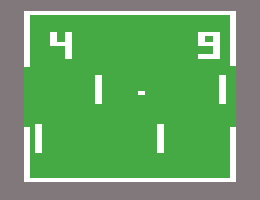Color TV-Game 15: Difference between revisions
No edit summary |
(:|) |
||
| Line 1: | Line 1: | ||
{{ArticleIcons|ssb4=y}} | {{ArticleIcons|ssb4=y}} | ||
{{AssistTrophy | {{AssistTrophy | ||
|name= | |name=Color TV-Game 15 | ||
|image= [[File:Color TV Game.png|300px]] | |image= [[File:Color TV Game.png|300px]] | ||
|caption=[[File:Symbol.png|50px]] | |caption=[[File:Symbol.png|50px]] | ||
| Line 13: | Line 13: | ||
|interwiki=wikipedia | |interwiki=wikipedia | ||
|interwikiname=Wikipedia | |interwikiname=Wikipedia | ||
|interwikipage= | |interwikipage=Color TV Game | ||
}} | }} | ||
The '''Color TV-Game 15''' ({{ja|テレビゲーム15|Terebigēmu15}}, ''TV-Game 15'') was one of the consoles of the ''[[wikipedia:Color TV Game|Color TV-Game]]'' line, acting as one of Nintendo's first forays into the video game industry. Released in 1977, the console currently acts as the oldest entity in the ''[[Super Smash Bros. (series)|Super Smash Bros.]]'' series, being three years older than [[Mr. Game & Watch]] and [[Pac-Man]]'s debuts in 1980 and 2 years older than [[Sheriff]]. | The '''Color TV-Game 15''' ({{ja|テレビゲーム15|Terebigēmu15}}, ''TV-Game 15'') was one of the consoles of the ''[[wikipedia:Color TV Game|Color TV-Game]]'' line, acting as one of Nintendo's first forays into the video game industry. Released in 1977, the console currently acts as the oldest entity in the ''[[Super Smash Bros. (series)|Super Smash Bros.]]'' series, being three years older than [[Mr. Game & Watch]] and [[Pac-Man]]'s debuts in 1980 and 2 years older than [[Sheriff]]. | ||
| Line 34: | Line 34: | ||
==Origin== | ==Origin== | ||
[[File:RealLifeColorTVGame15.png|thumb|right|The ''Color TV-Game 15'' console.]] | [[File:RealLifeColorTVGame15.png|thumb|right|The ''Color TV-Game 15'' console.]] | ||
The '' | The ''Color TV-Game'' line of consoles was a series of consoles produced by [[Nintendo]] in the late 1970s, with all consoles only being released in Japan. The ''Color TV-Game'' series was among the numerous [[wikipedia:Pong|''Pong'' clones]] produced after the production of ''Pong'' by [[wikipedia:Nolan Bushnell|Nolan Bushnell]]'s Atari in 1972. The ''Color TV-Game 15'' was the second iteration of the console, featuring fifteen game variants over the six offered by its predecessor. The paddles move in linear paths with the same consistent speed, in homage to how the original game was controlled by using microswitches. | ||
{{Template:AssistTrophies}} | {{Template:AssistTrophies}} | ||
Revision as of 07:26, April 5, 2015
| Color TV-Game 15 | |
|---|---|
 File:Symbol.png Color TV-Game 15, as it appears in Color TV-Game 15. | |
| Universe | Color TV-Game |
| Debut | Color TV-Game 6 (1977) |
| Smash Bros. appearances | SSB4 |
| Most recent appearance | WarioWare: Smooth Moves (cameo, 2006) |
| Console of origin | Color TV-Game |
| Species | Paddle |
| Article on Wikipedia | Color TV Game |
The Color TV-Game 15 (テレビゲーム15, TV-Game 15) was one of the consoles of the Color TV-Game line, acting as one of Nintendo's first forays into the video game industry. Released in 1977, the console currently acts as the oldest entity in the Super Smash Bros. series, being three years older than Mr. Game & Watch and Pac-Man's debuts in 1980 and 2 years older than Sheriff.
In Super Smash Bros. 4
As an Assist Trophy
The Color TV-Game 15 made its Smash Bros. debut as an assist trophy in the fourth game of the series. Upon being summoned, two paddles from the game appear on-screen, playing a game of Pong by themselves, with the score appearing above each paddle. Not only does the ball that is bounced between the paddles harm players, the paddles themselves reflect projectiles for the opponents of the summoner and deal knockback to enemies that touch the paddles, while not inflicting any damage.
In Super Smash Bros. for Wii U, from the Super Smash Bros. Direct.
Trophy information
The Color TV-Game 15 trophy appears in both versions. In Super Smash Bros. for Nintendo 3DS is a Challenge reward, obtained by playing 50 combined hours in the Smash mode. In Super Smash Bros. for Wii U it is part of the Memorabilia Trophy Box.
- Color TV-Game 15
Origin
The Color TV-Game line of consoles was a series of consoles produced by Nintendo in the late 1970s, with all consoles only being released in Japan. The Color TV-Game series was among the numerous Pong clones produced after the production of Pong by Nolan Bushnell's Atari in 1972. The Color TV-Game 15 was the second iteration of the console, featuring fifteen game variants over the six offered by its predecessor. The paddles move in linear paths with the same consistent speed, in homage to how the original game was controlled by using microswitches.




